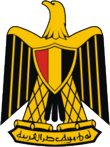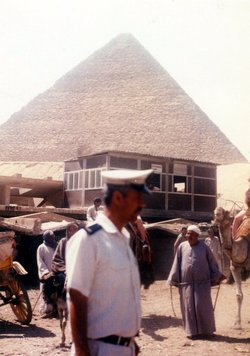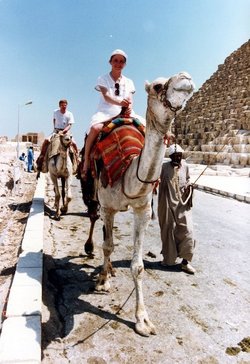Египет
Sysop (обсуждение | вклад) |
Sysop (обсуждение | вклад) |
||
| Строка 46: | Строка 46: | ||
===Телефоны оперативных служб=== | ===Телефоны оперативных служб=== | ||
===Санитарная обстановка=== | ===Санитарная обстановка=== | ||
| − | + | Разлитая в бутылки минеральная вода широко доступна, особенно Baraka ("Благословение"; компания принадлежит Nestl Г ©); марка Siwa (от оазиса того же самого названия) менее широко распределена. Прежний входит в 1.5 литра, один литр и бутылки полулитра. Если туристы просят воду, предполагается, что они подразумевают минеральную воду, если они определенно не спрашивают воду из-под крана (mayya baladi), который является безопасным выпить в главных городах и городах, но слишком хлорированный для неба среднего посетителя; люди с чувствительным stomachs должны определенно придерживаться воды в бутылках. Покупая минеральную воду, мудро проверить, что печать неповреждена; от не подозревающих туристов можно отделаться водой из-под крана - любимая уловка в курорте туристов Dahab. | |
| + | |||
| + | |||
===Преступность=== | ===Преступность=== | ||
Версия 07:50, 2 мая 2006
| |||||
| Девиз: нет | |||||

| |||||
| Столица | Каир | ||||
| Крупнейший город | Каир | ||||
| Официальный язык | арабский | ||||
| Государственный строй | республика | ||||
| Территория • Всего • Воды (%) |
1 001 450 км² 0,6 | ||||
| Население • Численность • Место в мире • Плотность |
77 505 800 15 77 чел./км² | ||||
| Валюта | египетский фунт LE (EGP) | ||||
| Часовой пояс • Летнее время |
+2 +3 | ||||
| Домен интернета | .eg | ||||
| Телефонный код | +20 | ||||
| Код автомобильного номера | ET | ||||
Египет - это государство в Африке
Содержание |
География
Города
История
Государственные и общественные праздники
- 1 января - Новый Год
- 25 апреля - День Освобождения
- 1 мая - День Труда
- 23 июля - День Революции
- 6 октября - День Армии
- 23 октября - День Суэца
- 23 декабря - День Победы
Памятка туриста
Телефоны оперативных служб
Санитарная обстановка
Разлитая в бутылки минеральная вода широко доступна, особенно Baraka ("Благословение"; компания принадлежит Nestl Г ©); марка Siwa (от оазиса того же самого названия) менее широко распределена. Прежний входит в 1.5 литра, один литр и бутылки полулитра. Если туристы просят воду, предполагается, что они подразумевают минеральную воду, если они определенно не спрашивают воду из-под крана (mayya baladi), который является безопасным выпить в главных городах и городах, но слишком хлорированный для неба среднего посетителя; люди с чувствительным stomachs должны определенно придерживаться воды в бутылках. Покупая минеральную воду, мудро проверить, что печать неповреждена; от не подозревающих туристов можно отделаться водой из-под крана - любимая уловка в курорте туристов Dahab.
Преступность
While relatively few in number, pickpockets are skilled and concentrate on tourists. Most operate in Cairo, notably in queues and on the crowded buses to the Pyramids. To play safe, keep your valuables in a money belt or a pouch under your shirt (leather or cotton materials are preferable to nylon, which can irritate in the heat). Overall, though, casual theft is more of a problem. Campsites, hostels and cheap hotels often have poor security, making it unwise to leave valuables there. At most places, you can deposit them at the reception (always get a receipt for cash).
If you are driving , it goes without saying you should not leave anything you cannot afford to lose visible or accessible in your car.
The level of terrorism in Egypt has been reduced, following a crackdown on Islamic extremists and a ceasefire signed in March 1999 by the terrorist group responsible for many of the attacks on tourists. Although security forces and government officials are the prime targets for terrorists, tourists have reason to feel threatened, as Islamic radicals have shot at trains and tour buses, and even detonated a bomb inside one of the Pyramids. The worst incidents have been the killing of 17 Greek tourists in Cairo in April 1996, and the Luxor massacre of 1997 in which more than sixty people died. The situation is far from bad enough to warrant staying away altogether, but it's still a good idea to follow the news (as tourist attacks are often in response to Israeli actions), and also heed any travel advisory bulletins issued by your own government.
Aside from the (small) risk of riding through Middle Egypt on the train, it is easy to avoid trouble spots : the latest rundown of areas considered unsafe can be obtained from government advice lines in Britain (tel 0374/500-926) and the US (tel 202/647-5225), or from consulates in Cairo.
With the object of safeguarding tourists, certain travel restrictions have been imposed on foreigners. In Cairo, Luxor and Aswan, railway clerks have been told not to sell tickets for any trains up or down the Nile Valley except on those services designated for tourists, which have plainclothes guards riding shotgun. Tourist buses between Cairo and Israel, and from Aswan to Luxor or Abu Simbel (if operating), must travel in a convoy ( kol) with a police escort. Perversely, there is no formal ban on visiting "risky" areas, but the local police will certainly keep a close eye on you, and may insist on accompanying you to sites like Abydos or Dendara.
Another wise move is to respect local customs (in public, anyway). The less you stand out and cause offence, the smaller the chance of attracting any hostility. By going with the swim of society, you'll gain a measure of protection. There are also armed police everywhere, whose mission includes keeping an eye on your safety, but as their usual response to trouble is to let rip with Kalashnikovs, this is a somewhat mixed blessing. In the event of real trouble , hit the deck or get off the streets immediately.
Местные обычаи и нравы
Таможенные правила и ограничения
Виза
Посольства
Транспорт
Как доехать
- На самолете:
- На автомобиле или автобусом:
- Поездом:
- По морю:
Пограничные пункты с сопредельными странами
Прокат автомобиля
Некоторые правила дорожного движения
Гостиницы
Еда
Alcohol can be obtained in most parts of Egypt, but the range of outlets is limited. In the Western Desert oases or Middle Egypt its sale is severely restricted or entirely prohibited. As a rule of thumb, hotels or Greek restaurants are the places to try; if you can't see anyone drinking it, there's none to be had. When you do manage to locate a drink, keep in mind that the hot, dry climate makes for dehydration, and agonizing hangovers can easily result from overindulgence. Public drunkenness is totally unacceptable in Egypt. In deference to the non-drinking Muslim majority, the sale of alcohol is prohibited on the Prophet Mohammed's birthday and the first and last days of Ramadan (if not during the whole month).
Beer , whose consumption goes back to pharaonic times, is the most widely available form of alcohol. Native Stella beer is a light lager in half-litre bottles, which is okay if it hasn't sat in the sun for too long (some claim that the brown glass bottles are better than the green ones). To check that it hasn't gone flat, invert the bottle before opening and look for a fizzy head. Stella retails in most places for £E5-6, though discos may charge as much as £E10. Stella Export, with a blue rather than yellow label, is pricier (£E9-15) and comes in smaller bottles. Marzen, a dark bock beer, appears briefly in the spring; Aswali is a dark beer produced in Aswan. Imported beer, which is the most expensive (£E15-20), only appears in bars, flash hotels and restaurants. There is also Birrel, a non-alcoholic beer.
A half-dozen or so Egyptian wines are produced near Alexandria. Since an Englishwoman died after drinking a bottle spiked with methanol in 1996, many tourists won't touch them. Even discounting such fears, none is especially good, though they're drinkable with a meal. The most commonly found are Omar Khayyam (an awful dry red), Cru des Ptolémées (a poor dry white), and Rubis d'Egypte (an acceptable rosé). A new range of wines called Obélisque emerged in 1999, whose Rouge des Pharoahs is pretty good, though the rosé is less so and the white positively sickly. In most restaurants all these wines retail for about £E32 a bottle.
For serious drinking, Egyptians get stuck into spirits, mixed with beer. The favoured tipple is brandy , known by the slang name of jaz (literally, "bottle"), which comes under three labels: Ahmar (the cheapest), Maa'tak (the best) and Vin (the most common). Zibib is similar to Greek ouzo, but drunk neat. Avoid vile Egyptian-made gin and whisky , whose labels are designed to resemble famous Western brands. Imported spirits are sold at duty-free shops in the main resorts for modest sums (Johnny Walker Red Label US$12; Stolichnaya vodka US$7). Beware of Egyptians conning you into buying them duty-free liquor for resale on the black market .



